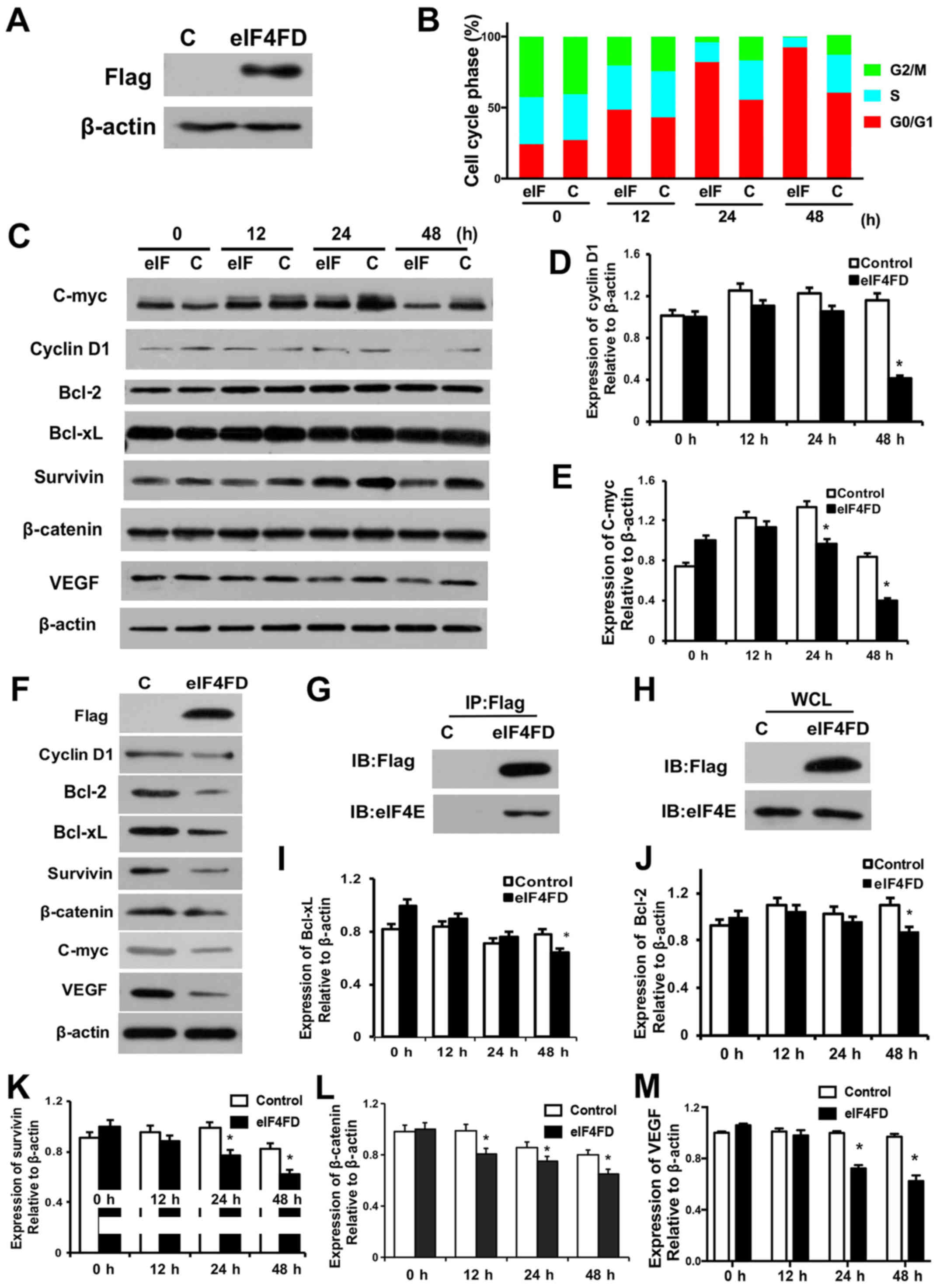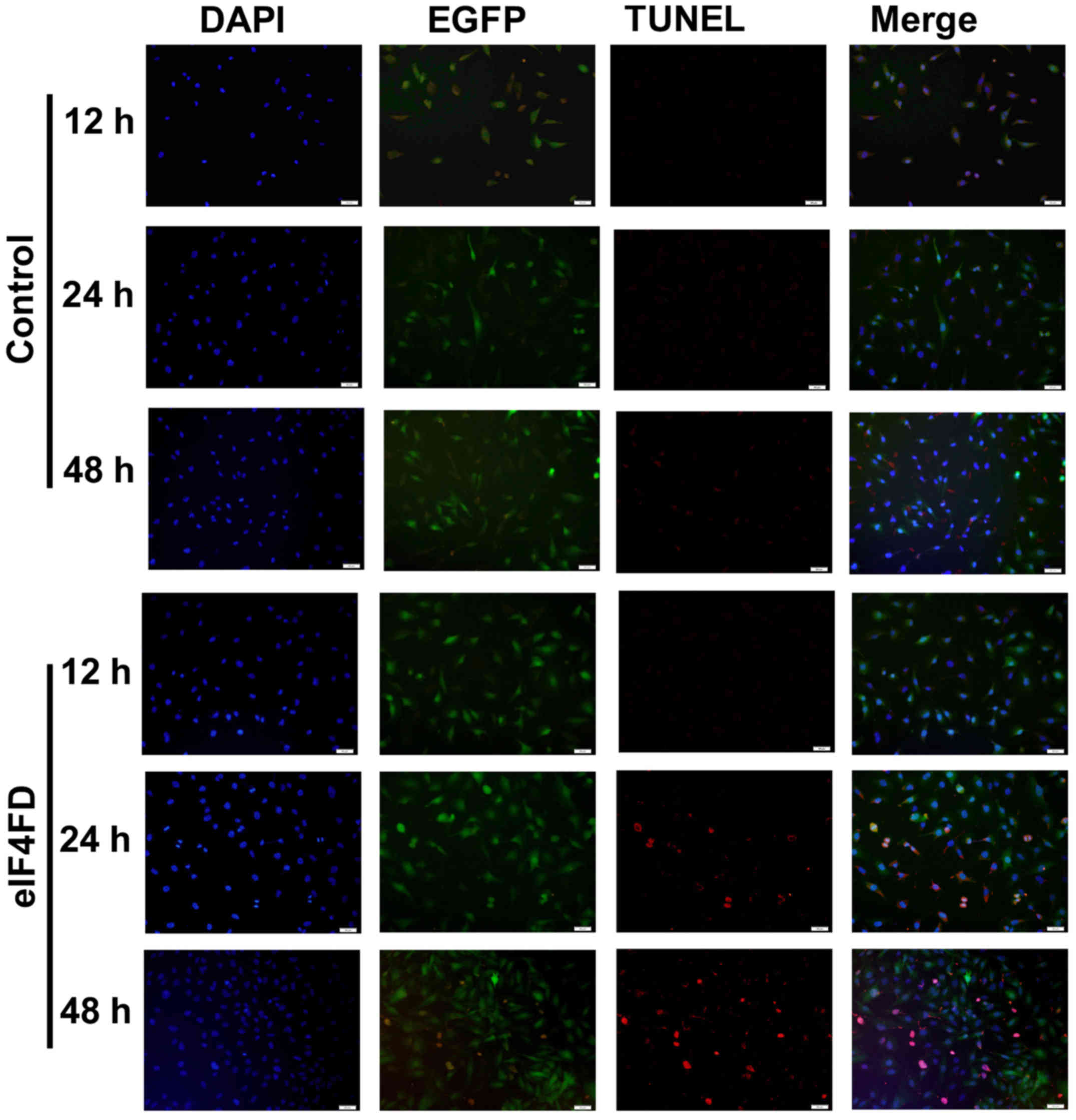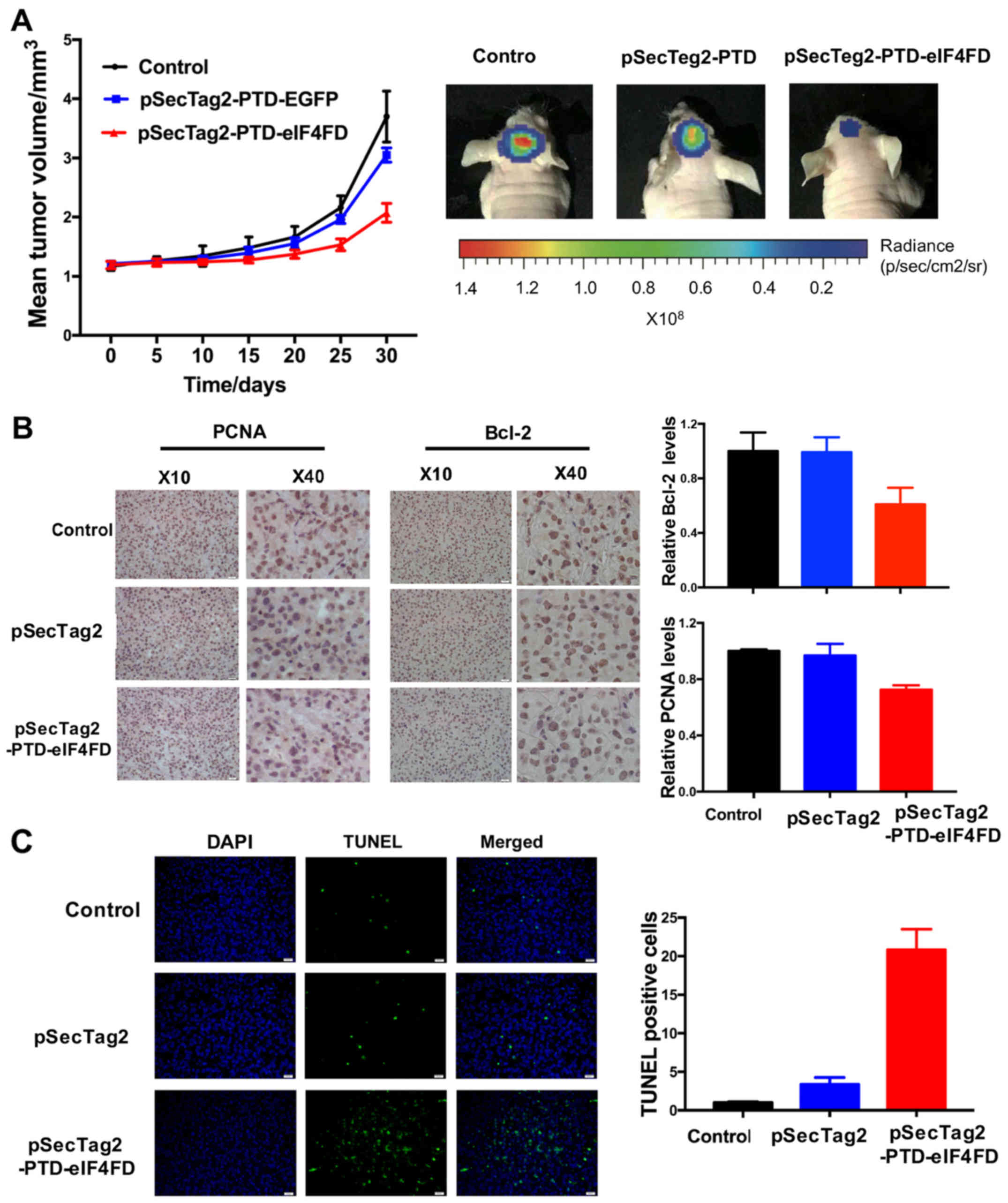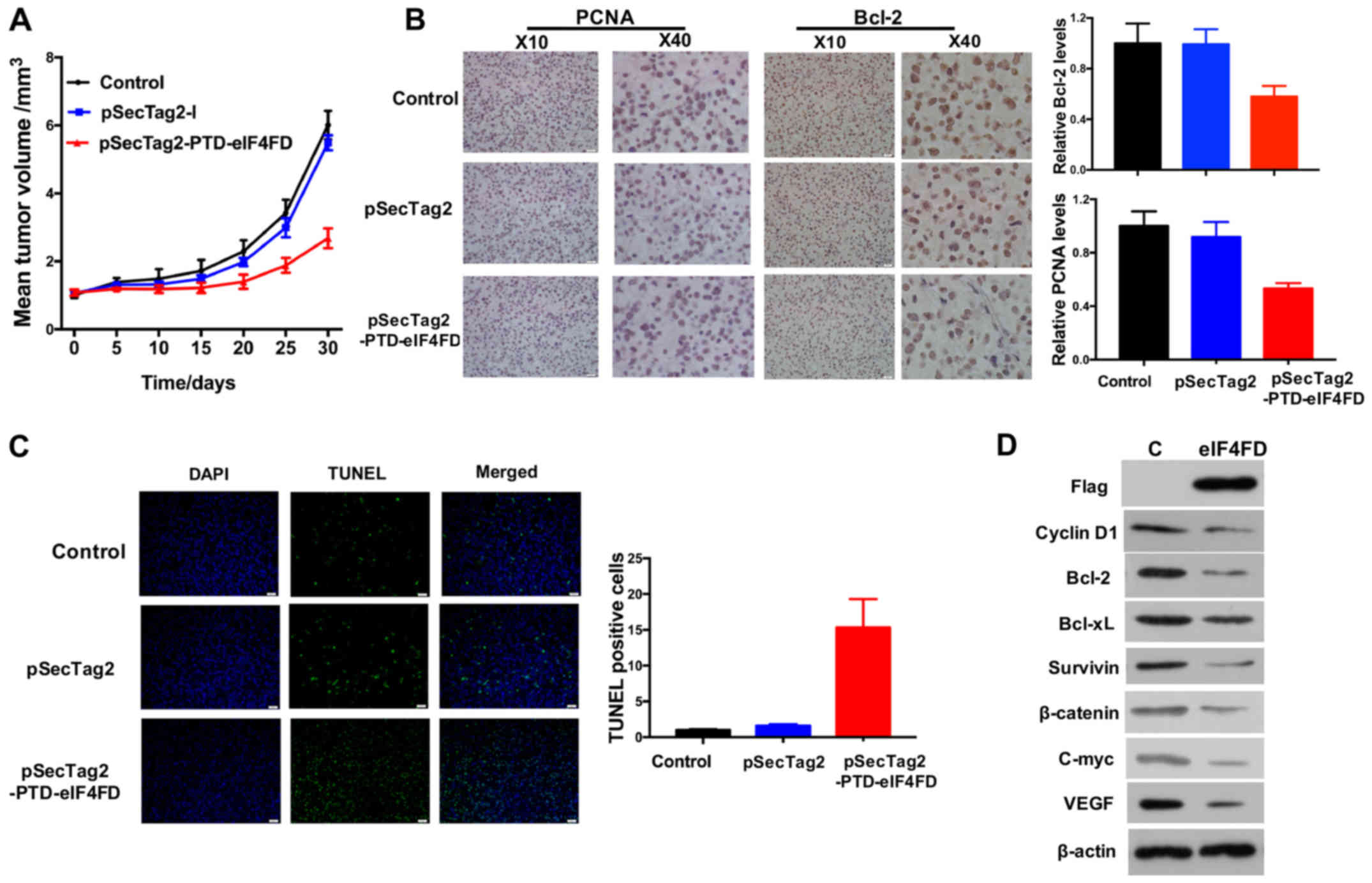|
1
|
Bastien JI, McNeill KA and Fine HA:
Molecular characterizations of glioblastoma, targeted therapy, and
clinical results to date. Cancer. 121:502–516. 2015. View Article : Google Scholar : PubMed/NCBI
|
|
2
|
Jane EP, Premkumar DR, Cavaleri JM, Sutera
PA, Rajasekar T and Pollack IF: Dinaciclib, a Cyclin-Dependent
Kinase inhibitor promotes proteasomal degradation of Mcl-1 and
enhances ABT-737 mediated cell death in malignant human glioma cell
lines. J Pharmacol Exp Ther. 356:354–365. 2016. View Article : Google Scholar : PubMed/NCBI
|
|
3
|
Rybalkina EY, Pavlova GV and Stavrovskaya
AA: Recent news in the glioblastoma research. Biochem Moscow Suppl
Ser A. 9:1–12. 2015. View Article : Google Scholar
|
|
4
|
Graff JR, Konicek BW, Carter JH and
Marcusson EG: Targeting the eukaryotic translation initiation
factor 4E for cancer therapy. Cancer Res. 68:631–634. 2008.
View Article : Google Scholar : PubMed/NCBI
|
|
5
|
Hagner PR, Abraham S and Gartenhaus RB:
Targeting the translational machinery as a novel treatment strategy
for hematologic malignancies. Blood. 115:2127–2135. 2010.
View Article : Google Scholar : PubMed/NCBI
|
|
6
|
Hsieh AC and Ruggero D: Targeting
eukaryotic translation initiation factor 4E (eIF4E) in cancer. Clin
Cancer Res. 16:4914–4920. 2010. View Article : Google Scholar : PubMed/NCBI
|
|
7
|
Rhoads RE: eIF4E: New family members, new
binding partners, new roles. J Biol Chem. 284:16711–16715. 2009.
View Article : Google Scholar : PubMed/NCBI
|
|
8
|
Graff JR, Konicek BW, Vincent TM, Lynch
RL, Monteith D, Weir SN, Schwier P, Capen A, Goode RL, Dowless MS,
et al: Therapeutic suppression of translation initiation factor
eIF4E expression reduces tumor growth without toxicity. J Clin
Invest. 117:2638–2648. 2007. View
Article : Google Scholar : PubMed/NCBI
|
|
9
|
Peponi E, Drakos E, Reyes G, Leventaki V,
Rassidakis GZ and Medeiros LJ: Activation of mammalian target of
rapamycin signaling promotes cell cycle progression and protects
cells from apoptosis in mantle cell lymphoma. Am J Pathol.
169:2171–2180. 2006. View Article : Google Scholar : PubMed/NCBI
|
|
10
|
Karni R, Gus Y, Dor Y, Meyuhas O and
Levitzki A: Active Src elevates the expression of beta-catenin by
enhancement of cap-dependent translation. Mol Cell Biol.
25:5031–5039. 2005. View Article : Google Scholar : PubMed/NCBI
|
|
11
|
Torres VA, Tapia JC, Rodriguez DA, Lladser
A, Arredondo C, Leyton L and Quest AF: E-cadherin is required for
caveolin-1-mediated down-regulation of the inhibitor of apoptosis
protein survivin via reduced beta-catenin-Tcf/Lef-dependent
transcription. Mol Cell Biol. 27:7703–7717. 2007. View Article : Google Scholar : PubMed/NCBI
|
|
12
|
Lin CJ, Nasr Z, Premsrirut PK, Porco JA
Jr, Hippo Y, Lowe SW and Pelletier J: Targeting synthetic lethal
interactions between Myc and the eIF4F complex impedes
tumorigenesis. Cell Rep. 1:325–333. 2012. View Article : Google Scholar : PubMed/NCBI
|
|
13
|
Boussemart L, Malka-Mahieu H, Girault I,
Allard D, Hemmingsson O, Tomasic G, Thomas M, Basmadjian C, Ribeiro
N, Thuaud F, et al: eIF4F is a nexus of resistance to anti-BRAF and
anti-MEK cancer therapies. Nature. 513:105–109. 2014. View Article : Google Scholar : PubMed/NCBI
|
|
14
|
Zhou H and Huang S: Role of mTOR signaling
in tumor cell motility, invasion and metastasis. Curr Protein Pept
Sci. 12:30–42. 2011. View Article : Google Scholar : PubMed/NCBI
|
|
15
|
Robichaud N and Sonenberg N: eIF4E and Its
Binding ProteinsParsyan A: Translat Regulat Cancer Biol Med.
Springer; Dordrecht: pp. 73–113. 2014
|
|
16
|
Satheesha S, Cookson VJ, Coleman LJ,
Ingram N, Madhok B, Hanby AM, Suleman CA, Sabine VS, Macaskill EJ,
Bartlett JM, et al: Response to mTOR inhibition: Activity of eIF4E
predicts sensitivity in cell lines and acquired changes in eIF4E
regulation in breast cancer. Mol Cancer. 10:192011. View Article : Google Scholar : PubMed/NCBI
|
|
17
|
Ayuso MI, Martinez-Alonso E, Salvador N,
Bonova P, Regidor I and Alcázar A: Dissociation of eIF4E-binding
protein 2 (4E-BP2) from eIF4E independent of
Thr37/Thr46 phosphorylation in the ischemic
stress response. PLoS One. 10:e01219582015. View Article : Google Scholar : PubMed/NCBI
|
|
18
|
Lukhele S, Bah A, Lin H, Sonenberg N and
Forman-Kay JD: Interaction of the eukaryotic initiation factor 4E
with 4E-BP2 at a dynamic bipartite interface. Structure.
21:2186–2196. 2013. View Article : Google Scholar : PubMed/NCBI
|
|
19
|
Patel LN, Zaro JL and Shen WC: Cell
penetrating peptides: Intracellular pathways and pharmaceutical
perspectives. Pharm Res. 24:1977–1992. 2007. View Article : Google Scholar : PubMed/NCBI
|
|
20
|
Wagstaff KM and Jans DA: Protein
transduction: Cell penetrating peptides and their therapeutic
applications. Curr Med Chem. 13:1371–1387. 2006. View Article : Google Scholar : PubMed/NCBI
|
|
21
|
Ozawa T, Wang J, Hu LJ, Bollen AW, Lamborn
KR and Deen DF: Growth of human glioblastomas as xenografts in the
brains of athymic rats. In Vivo. 16:55–60. 2002.PubMed/NCBI
|
|
22
|
Candolfi M, Curtin JF, Nichols WS,
Muhammad AG, King GD, Pluhar GE, McNiel EA, Ohlfest JR, Freese AB,
Moore PF, et al: Intracranial glioblastoma models in preclinical
neuro-oncology: Neuropathological characterization and tumor
progression. J Neurooncol. 85:133–148. 2007. View Article : Google Scholar : PubMed/NCBI
|
|
23
|
Doherty JE, Woodard LE, Bear AS, Foster AE
and Wilson MH: An adaptable system for improving transposon-based
gene expression in vivo via transient transgene repression. FASEB
J. 27:3753–3762. 2013. View Article : Google Scholar : PubMed/NCBI
|
|
24
|
Wu M, Liu Y, Di X, Kang H, Zeng H, Zhao Y,
Cai K, Pang T, Wang S, Yao Y and Hu X: EIF4E over-expresses and
enhances cell proliferation and cell cycle progression in
nasopharyngeal carcinoma. Med Oncol. 30:4002013. View Article : Google Scholar : PubMed/NCBI
|
|
25
|
Pettersson F, Del Rincon SV, Emond A, Huor
B, Ngan E, Ng J, Dobocan MC, Siegel PM and Miller WH Jr: Genetic
and pharmacologic inhibition of eIF4E reduces breast cancer cell
migration, invasion, and metastasis. Cancer Res. 75:1102–1112.
2015. View Article : Google Scholar : PubMed/NCBI
|
|
26
|
Zhou FF, Yan M, Guo GF, Wang F, Qiu HJ,
Zheng FM, Zhang Y, Liu Q, Zhu XF and Xia LP: Knockdown of eIF4E
suppresses cell growth and migration, enhances chemosensitivity and
correlates with increase in Bax/Bcl-2 ratio in triple-negative
breast cancer cells. Med Oncol. 28:1302–1307. 2011. View Article : Google Scholar : PubMed/NCBI
|
|
27
|
Campbell L, Jasani B, Griffiths DF and
Gumbleton M: Phospho-4e-BP1 and eIF4E overexpression
synergistically drives disease progression in clinically confined
clear cell renal cell carcinoma. Am J Cancer Res. 5:2838–2848.
2015.PubMed/NCBI
|
|
28
|
Yang X, Dong QF, Li LW, Huo JL, Li PQ, Fei
Z and Zhen HN: The cap-translation inhibitor 4EGI-1 induces
mitochondrial dysfunction via regulation of mitochondrial dynamic
proteins in human glioma U251 cells. Neurochem Int. 90:98–106.
2015. View Article : Google Scholar : PubMed/NCBI
|
|
29
|
Di Marino D, D'Annessa I, Tancredi H,
Bagni C and Gallicchio E: A unique binding mode of the eukaryotic
translation initiation factor 4E for guiding the design of novel
peptide inhibitors. Protein Sci. 24:1370–1382. 2015. View Article : Google Scholar : PubMed/NCBI
|
|
30
|
Liao A, Shi R, Jiang Y, Tian S, Li P, Song
F, Qu Y, Li J, Yun H and Yang X: SDF-1/CXCR4 axis regulates cell
cycle progression and epithelial-mesenchymal transition via
up-regulation of survivin in glioblastoma. Mol Neurobiol.
53:210–215. 2016. View Article : Google Scholar : PubMed/NCBI
|
|
31
|
Kim KI, Cho HJ, Hahn JY, Kim TY, Park KW,
Koo BK, Shin CS, Kim CH, Oh BH, Lee MM, et al: Beta-catenin
overexpression augments angiogenesis and skeletal muscle
regeneration through dual mechanism of vascular endothelial growth
factor-mediated endothelial cell proliferation and progenitor cell
mobilization. Arterioscler Thromb Vasc Biol. 26:91–98. 2006.
View Article : Google Scholar : PubMed/NCBI
|
|
32
|
Jacobson BA, Alter MD, Kratzke MG,
Frizelle SP, Zhang Y, Peterson MS, Avdulov S, Mohorn RP, Whitson
BA, Bitterman PB, et al: Repression of cap-dependent translation
attenuates the transformed phenotype in non-small cell lung cancer
both in vitro and in vivo. Cancer Res. 66:4256–4262. 2006.
View Article : Google Scholar : PubMed/NCBI
|
|
33
|
Yang H, Li LW, Shi M, Wang JH, Xiao F,
Zhou B, Diao LQ, Long XL, Liu XL and Xu L: In vivo study of breast
carcinoma radiosensitization by targeting eIF4E. Biochem Biophys
Res Commun. 423:878–883. 2012. View Article : Google Scholar : PubMed/NCBI
|


















